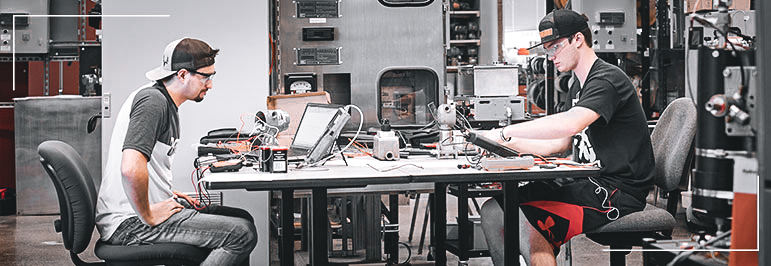Instrumentation and Control Technology

Instrumentation and Control Technology - AAS-T
This program will prepare you for a career as an instrumentation and control technician for high-tech industries such as power generation plants, water treatment facilities, chemical manufacturing plants, canneries, aerospace plants, bio-pharmaceutical plants, semi conductor manufacturing plants, and pulp and paper mills.
You will learn how to maintain, repair, and troubleshoot instrumentation and control systems in industries that increasingly rely on automation. Instrumentation & Control is a great program choice if you’re looking for a high-wage career with employment potential across the nation and beyond.
Employment Information
Data are provided on a program (not credential) level
76% BTC graduate placement rate1
$75,441 starting annual wage2
$94,978 average annual wage2
$111,421 potential annual wage2
Entry Information
When Can I Start?
This program admits students once a year, in the Fall quarter.
What are the Minimum Entry Requirements?
A completed college admissions application and placement in English and math. BTC uses a Guided Self-Placement process to help you choose the best starting point for your English and math courses. Your selections will determine whether you begin with program coursework or complete prerequisites classes first.
To get started or for help determining your English and math placement, contact the Outreach department at Outreach@btc.edu.
Early Program Course Requirements
Completion of Intermediate Algebra (MATH 099) or placement into Pre-Calculus (MATH&141) is a required prerequisite for enrollment in this Program.
What are My Next Steps?
Classes
Total Program Credits: 111
Quarter 1
AM 100 Advanced Manufacturing Pathways 3 CR AM 105 Direct Current 4 CR PTEC 102 Process Technology I (Equipment) 5 CR MATH& 141 Precalculus I 5 CR or higher Quarter 2
INST 102 Advanced Electrical Fundamentals 10 CR INST 103 Practical Advanced Electrical Fundamentals 6 CR ENGL& 101 English Composition I 5 CR or higher Quarter 3
INST 107 Digital Automation Fundamentals 8 CR INST 108 Practical Digital Automation Fundamentals 8 CR CMST& 210 Interpersonal Communications 5 CR Quarter 4
INST 240 Pressure and Level Measurement 6 CR INST 250 Final Control Elements 5 CR INST 251 PID Control 5 CR Quarter 5
INST 205 Job Preparation I 1 CR INST 241 Temperature & Flow Measurement 6 CR INST 260 Data Acquisition Systems 4 CR INST 262 Digital Control Systems 5 CR PSYC& 100 General Psychology 5 CR Quarter 6
INST 206 Job Preparation II 1 CR INST 242 Analytical Measurement 5 CR INST 252 Loop Tuning 4 CR INST 263 Control Strategies 5 CR
Program Outcomes
- Communication - Communicates and expresses thoughts across a variety of mediums (verbal, written, visually) to effectively persuade, inform, and clarify ideas with colleagues.
- Time Management - Arrives on time and prepared to work; budgets time an meets deadlines when performing technical tasks and projects.
- Safety - Complies with national, state, and local safety regulations when repairing, calibrating, and installing instruments.
- Diagnose and Repair Existing Instruments - Assesses, diagnoses, and repairs faulty instruments in measurement and control systems using logical procedures and appropriate test equipment.
- Install and Configure New Instruments - Builds, configures, and installs new instrument systems according to plans, applying industry construction standards, and ensuring correct system operation when complete.
- Process Control Optimization - Improve system functions by evaluating control system performance; implements strategies to tune and stabilize control systems.
- Instrument Calibration - Assesses instrument accuracy and correct inaccuracies using appropriate calibration procedures and test equipment.
- Documents Instrument Systems - Interprets and creates technical documents (electronic schematics, loop diagrams, and P&IDs) according to industry (EIA, ISA) standards.
- Self-Directing Learning - Selects and researches relevant information sources to learn new principles, technologies, and techniques.
- Career Development - Researches and seeks opportunities for promotion and job advancements in work and career settings.
Employment Outlook
The need for industry to reduce operating expenses requires continual investment in automation, which means more jobs for instrumentation technicians.
Most program graduates work as instrumentation and process control technicians in bio-pharmaceutical manufacturing facilities, oil refineries, food processing, pulp/paper mills, power plants, metal smelters, systems integrators, research and development or water/sewage treatment facilities. Opportunities also exist in medical instrumentation, chemical plants, canneries, aerospace, sales and communications.
Faculty & Support

Matthew Ziels
Instrumentation & Control Technology
Ryan Anderson
Instrumentation and Control TechnologyContacts
If you have questions about this program or want help with the admissions steps to Bellingham Technical College, please email outreach@btc.edu.
Current students wanting academic planning and support, can connect with the program Instructor(s) or email AdvancedManufacturingNav@btc.edu
